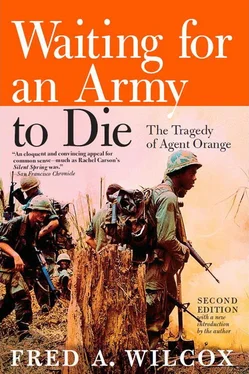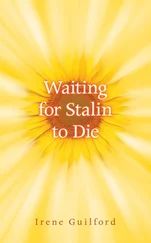This is said without a trace of bitterness or anger, just the matter-of-fact manner of a man who knows that the government he served has lied to him and his fellow veterans for many years. As a member of the New York State Temporary Commission on Dioxin Exposure he has talked to hundreds, perhaps even thousands, of Vietnam veterans throughout the nation. And he has heard time and again that the use of defoliants was not confined to remote areas of Vietnam, that base camp perimeters were routinely sprayed, and C-123s sometimes jettisoned their thousand-gallon loads near or directly on areas occupied by American servicemen. From General Accounting Office reports he discovered that his unit had been deployed in defoliated areas; and from HERBS tapes (which do not include information about Navy Seabee, Army Engineer, Marine Corps Engineer, South Vietnamese, Australian, or CIA use of defoliants in Vietnam) he found that the year he spent in Vietnam had been one of the peak years for the military’s use of defoliants.
“There can be no question that the Department of Defense and the Veterans Administration perpetuated a fraud on the American public by insisting for a good solid eighteen months when I first became involved in this issue that we were not exposed, we were not at risk of exposure, and American ground forces were not in areas that had been sprayed. And then, thanks to Senator Percy’s efforts to get the General Accounting Office to examine the DOD’s records, we find out that not only were we in areas that had been defoliated, but that some of these areas had been sprayed directly on several occasions with herbicides that were hundreds of times more contaminated with TCDD-dioxin than the strongest herbicide used domestically in the US.
“Yet it took us forever to get any information from the Veterans Administration and the Department of Defense. We’ve had so little cooperation from the people who were involved in administrating the war. Every step along the way we’ve had to file a Freedom of Information Act claim to get information. It’s been like pulling teeth since day one to get any information out of the Veterans Administration. But why do they behave this way? I still don’t quite understand it. I’ve met with them, and it seems rather obvious to me that the heavy lobbying of Dow, Monsanto, Diamond Shamrock, and Uniroyal have an influence on the government’s decisions. As an individual, and as a Vietnam veteran, I can only think that when they all get together in the friendly back room or by the poolside and they dip their well-manicured fingers into the caviar jar, the conversation is ‘How are we going to keep these young guys who have in fact been poisoned by dioxin from collecting what’s justly theirs?’ And the way they decide to do that is through the bureaucracy : Just keep putting up the barrier of no cause and effect, no correlation, and never do the tests that might prove we’re right. When you do spend over a hundred thousand dollars to design a study, just make sure it’s like the UCLA epidemiological protocol, that it’s doctored up and utterly useless. That way you can stall progress for another two, five, ten years. No, I think it’s dollars, big money, and that’s what’s really behind all this. We Vietnam veterans have been given a price tag, and the tag seems to be too high for the government to afford.”
In Vietnam, DeBoer did not feel that he was fighting for the state of New York, California, or Ohio. He and his fellow soldiers were there “as Americans, not as representatives of our individual states.” Thus he finds it difficult to understand “why the courthouse door is being closed to us now. In eighteen states veterans are time-barred by statute of limitations from arguing for compensation from the war contractors once the class action suit has been heard, and, we assume, won. And this is probably the most terrible, the most tragic thing that has happened to the Vietnam veterans. It’s the ultimate slap in the face to a people who were fighting tyranny and communism, or so they were told, to come home and be informed—and this may well include hundreds of thousands of men—that ‘No, you are not going to have your day in court. Yes, your brother veteran in California will be able to have his day in court, but you who live in any of the eighteen states where you are time-barred will not have your day.’”
Ron DeBoer was nineteen when he went to Vietnam. Today he is thirty-four. The organization that he founded three years ago no longer exists, and now he wants nothing more than to write about what it felt like to be a nineteen-year-old kid in Vietnam, to spend that first terrifying night in the jungle, to see the dead and the wounded, and to survive. But he has not given up the hope that his “brother veterans will be accorded the dignity and compassion to which they are entitled,” even though he knows that, in spite of cosmetic proclamations, rhetorical flourishes, and public relations scams, very little has changed at VA headquarters. The Agent Orange examination is still a game of Pin the Tail on the Donkey, useless and humiliating to the eighty thousand veterans who, distressed over their own deteriorating health and concerned that their future children might be born with a myriad of birth defects, have sought help at VA clinics. The anger and shock that followed his discovery that he had testicular cancer and that propelled him to work nonstop for three years on behalf of other Agent Orange victims has been replaced by stoicism.
“There’s nothing left anymore that these people can do that will affect me on an individual basis—you know, get me upset. They are beyond scruples. They are beyond decency. They will do anything. They will sit there and cover up, and they will tell you that there was absolutely no spraying in Laos, no spraying in Cambodia. And just as soon as we file a Freedom of Information Act they will admit that ‘Yes, we sprayed there. Yes, we lied all along.’ All the war contractors present this façade of true patriotism, but I’ve been saying ‘Profit before Patriotism’ for three years. They knew, or they damn well should have known, that their herbicide was contaminated with dioxin. As a matter of fact, their scientists knew years before anyone else just how toxic this substance was. And I really wouldn’t be that concerned with Dow’s credibility or sincerity if we had only dumped a couple hundred thousand gallons of Agent Orange on Vietnam, but when you consider eleven million gallons there is no one who can tell me that at some time Dow’s scientists didn’t sit down and ask, ‘Now wait a minute, just what the hell are they doing with all this stuff?’ We’re talking about three hundred and sixty-eight pounds of dioxin! A substance that kills laboratory animals in parts per billion , which is really only a microscopic dose.
“I’m familiar with all their arguments. We all are. That dioxin breaks down in sunlight. Well, sure it does if you place it on a petri dish in a laboratory, but in Vietnam it got into the muck, the water, and in the jungle where there was no sunlight. And Matthew Meselson [Harvard University] found it in fish that had been caught several kilometers from where we had sprayed, so it was dispersed into the food chain, and into our bodies.”
DeBoer believes that eventually “justice will be done to the Vietnam veterans and their families who have suffered because of their exposure to dioxin,” but he admits that he is not altogether certain what he means when he uses the word “justice.”
“I’ve asked myself that question so many times, and I know that there will be no victory in a traditional sense. This thing will never end with a victory party or people waving some sort of banners or something like that. But I think there will be an accounting for corporate irresponsibility, for chemical warfare, for the cover-ups. People are going to be exposed for what they were, and for what they are, because what do you say to a thirty-year-old widow? What do you say to a kid born with a missing arm or leg, a cleft palate, or duplicate sex organs? What are you going to say to that kid? That I won, that Ron DeBoer and all the other people, the Ryans and the McCarthys and the Mullers and everybody else involved won? What did we really do for you? We didn’t really do anything except get involved in something which we believed in, and something which, when you’ve had cancer and you think you might be dying and you look at all your brother veterans and see their problems, there really isn’t much choice but to get into it.
Читать дальше











